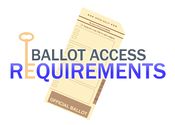Norman v. Reed
| Norman v. Reed | |
| Court: | U.S. Supreme Court |
| Text: | Text of decision |
| Holding: | |
| It was unconstitutional for the state of Illinois to require a new political party and its candidates to gather more than 25,000 signatures (the threshold for statewide office) to participate in elections for offices in political subdivisions. The ruling was, in part, a reaffirmation of the Court's earlier decision in Illinois State Board of Elections v. Socialist Workers Party. | |
| Case history | |
| Trial court: | Cook County Judicial Circuit Court |
| Appellate court: | Illinois Supreme Court |
| Appellate court: | U.S. Supreme Court |
| Author, appellate decision: | David Souter |
| Appellate court decision: | January 14, 1992 |
Norman v. Reed, a case decided by the U.S. Supreme Court in 1992, held that it was unconstitutional for the state of Illinois to require a new political party and its candidates to gather more than 25,000 signatures (the threshold for statewide office) to participate in elections for offices in political subdivisions. The ruling was, in part, a reaffirmation of the Court's earlier decision in Illinois State Board of Elections v. Socialist Workers Party.
Background
In order to form a new political party and field candidates for statewide office in Illinois, the aspirant party was required to gather 25,000 signatures of eligible voters. To field candidates for offices in large political subdivisions, the aspirant party was also required to collect 25,000 signatures of eligible voters within the subdivision. When a subdivision comprised separate districts from which some of its officers were elected, the aspirant party's organizers were required to collect 25,000 signatures from each district (thus, more than the 25,000 signatures required for statewide office).[1]
The Harold Washington Party (HWP), an established party within the city of Chicago, Illinois, sought to field candidates for office in Cook County, Illinois. In order to qualify for ballot access in Cook County, which is composed of two electoral districts (the city district and the suburban district), the party's organizers were required to collect 25,000 signatures from each of the two districts. Prior to the 1990 elections, the party submitted its petition, with 44,000 signatures from the city district and 7,800 from the suburban district. The party also submitted a slate of candidates for both at-large and district-specific offices. The Cook County Officers Electoral Board found that the failure to gather the required number of signatures in the suburban district precluded the party from fielding candidates for suburban district seats, but not city-district and countywide seats. The Board also rejected the claim that the new party could not use the HWP label, which had been utilized earlier by an existing party (i.e., the Chicago HWP).[1]
The County Circuit Court upheld the Board's decision regarding use of the party name, but ruled that the party's entire slate of candidates was ineligible due both to its failure to gather the requisite number of suburban district signatures and its failure to list judicial candidates. The Illinois Supreme Court ruled that the party could not use the name and that the entire slate of candidates was disqualified due to the party's failure to gather the required suburban district signatures.[1]
Decision
In a 7-1 decision, the Court ruled that the petitioners were eligible to use the HWP label in countywide elections, despite the fact that a party by that name had already been established in Chicago. Justice Souter, writing the majority opinion, said:
| “ |
While the Board based its answer to this question [i.e., use of the party name] on a determination that the city HWP had authorized petitioners to use the Party name, the State Supreme Court's order seems to exclude the very possibility of authorization, reading the prohibition on the "use of the name of an established political party" so literally as to bar candidates running in one political subdivision from ever using the name of a political party established only in another. ... [However], this Draconian construction of the statute would obviously foreclose the development of any political party lacking the resources to run a statewide campaign.[1][2] |
” |
The Court also ruled that the disputed signature requirements were unconstitutional. Souter argued that the Illinois Supreme Court's ruling violated the precedent established in Illinois State Board of Elections v. Socialist Workers Party. However, he did note that the state has a right to require aspirant candidates and parties to demonstrate a distribution of support throughout districts, provided that the total number of signatures required does not exceed that required for statewide office.[1][3]
Because the Illinois Supreme Court did not weigh in on the party's failure to field judicial candidates, the Court remanded the issue to the state Supreme Court.[1]
See also
- Ballot access for major and minor party candidates
- Other ballot access lawsuits:
- Williams v. Rhodes (1968)
- Bullock v. Carter (1972)
- Lubin v. Panish (1974)
- Storer v. Brown (1974)
- Illinois State Board of Elections v. Socialist Workers Party (1979)
- Anderson v. Celebrezze (1983)
- U.S. Term Limits, Inc. v. Thornton (1995)
External links
Footnotes
- ↑ 1.0 1.1 1.2 1.3 1.4 1.5 Justia.com, "Norman v. Reed - 502 U.S. 279 (1992)," accessed December 27, 2013
- ↑ Note: This text is quoted verbatim from the original source. Any inconsistencies are attributable to the original source.
- ↑ B.Y.U. Journal of Public Law, "The Constitution and the Ballot Box: Supreme Court Jurisprudence and Ballot Access for Independent Candidates," accessed December 27, 2013
| ||||||||||||||||




